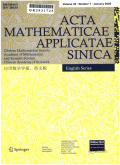- 钛学术文献服务平台 \
- 学术期刊 \
- 基础科学期刊 \
- 数学期刊 \
- 应用数学学报(英文版)期刊 \
Null-free False Discovery Rate Control Using Decoy Permutations
Null-free False Discovery Rate Control Using Decoy Permutations
基本信息来源于合作网站,原文需代理用户跳转至来源网站获取
摘要:
The traditional approaches to false discovery rate(FDR)control in multiple hypothesis testing are usually based on the null distribution of a test statistic.However,all types of null distributions,including the theoretical,permutation-based and empirical ones,have some inherent drawbacks.For example,the theoretical null might fail because of improper assumptions on the sample distribution.Here,we propose a null distribution-free approach to FDR control for multiple hypothesis testing in the case-control study.This approach,named target-decoy procedure,simply builds on the ordering of tests by some statistic or score,the null distribution of which is not required to be known.Competitive decoy tests are constructed from permutations of original samples and are used to estimate the false target discoveries.We prove that this approach controls the FDR when the score function is symmetric and the scores are independent between different tests.Simulation demonstrates that it is more stable and powerful than two popular traditional approaches,even in the existence of dependency.Evaluation is also made on two real datasets,including an arabidopsis genomics dataset and a COVID-19 proteomics dataset.

推荐文章
Shadow–highlight feature matching automatic small crater recognition using high-resolution digital o
Moon
Crater recognition
Image processing
Space exploration
Determination of Hf-Sr-Nd isotopic ratios by MC-ICP-MS using rapid acid digestion after flux-free fu
Certified reference material
Flux-free fusion
Hf-Sr-Nd isotopic ratio
Procedural blank
Rapid acid digestion
Kyanite far from equilibrium dissolution rate at 0–22℃ and pH of 3.5–7.5
Kinetics
Kyanite
Reaction rates
Mixed-flow reactor
内容分析
关键词云
关键词热度
相关文献总数
(/次)
(/年)
文献信息
| 篇名 | Null-free False Discovery Rate Control Using Decoy Permutations | ||
| 来源期刊 | 应用数学学报(英文版) | 学科 | |
| 关键词 | |||
| 年,卷(期) | 2022,(2) | 所属期刊栏目 | |
| 研究方向 | 页码范围 | 235-253 | |
| 页数 | 19页 | 分类号 | |
| 字数 | 语种 | 英文 | |
| DOI | |||
五维指标
引文网络
引文网络
二级参考文献 (0)
共引文献 (0)
参考文献 (0)
节点文献
引证文献 (0)
同被引文献 (0)
二级引证文献 (0)
2022(0)
- 参考文献(0)
- 二级参考文献(0)
- 引证文献(0)
- 二级引证文献(0)
引文网络交叉学科
相关学者/机构
期刊影响力
应用数学学报(英文版)
主办单位:
中国科学院应用数学研究所
中国数学会
出版周期:
季刊
ISSN:
0168-9673
CN:
11-2041/O1
开本:
16开
出版地:
北京市海淀区中关村东路55号
邮发代号:
创刊时间:
1984
语种:
eng
出版文献量(篇)
1519
总下载数(次)
0
总被引数(次)
3712
期刊文献
相关文献
推荐文献
- 期刊分类
- 期刊(年)
- 期刊(期)
- 期刊推荐
力学
化学
地球物理学
地质学
基础科学综合
大学学报
天文学
天文学、地球科学
数学
气象学
海洋学
物理学
生物学
生物科学
自然地理学和测绘学
自然科学总论
自然科学理论与方法
资源科学
非线性科学与系统科学
应用数学学报(英文版)2022
应用数学学报(英文版)2021
应用数学学报(英文版)2020
应用数学学报(英文版)2019
应用数学学报(英文版)2018
应用数学学报(英文版)2017
应用数学学报(英文版)2016
应用数学学报(英文版)2015
应用数学学报(英文版)2014
应用数学学报(英文版)2013
应用数学学报(英文版)2012
应用数学学报(英文版)2011
应用数学学报(英文版)2010
应用数学学报(英文版)2009
应用数学学报(英文版)2008
应用数学学报(英文版)2007
应用数学学报(英文版)2006
应用数学学报(英文版)2005
应用数学学报(英文版)2004
应用数学学报(英文版)2003
应用数学学报(英文版)2002
应用数学学报(英文版)2001

 免费查重
免费查重










